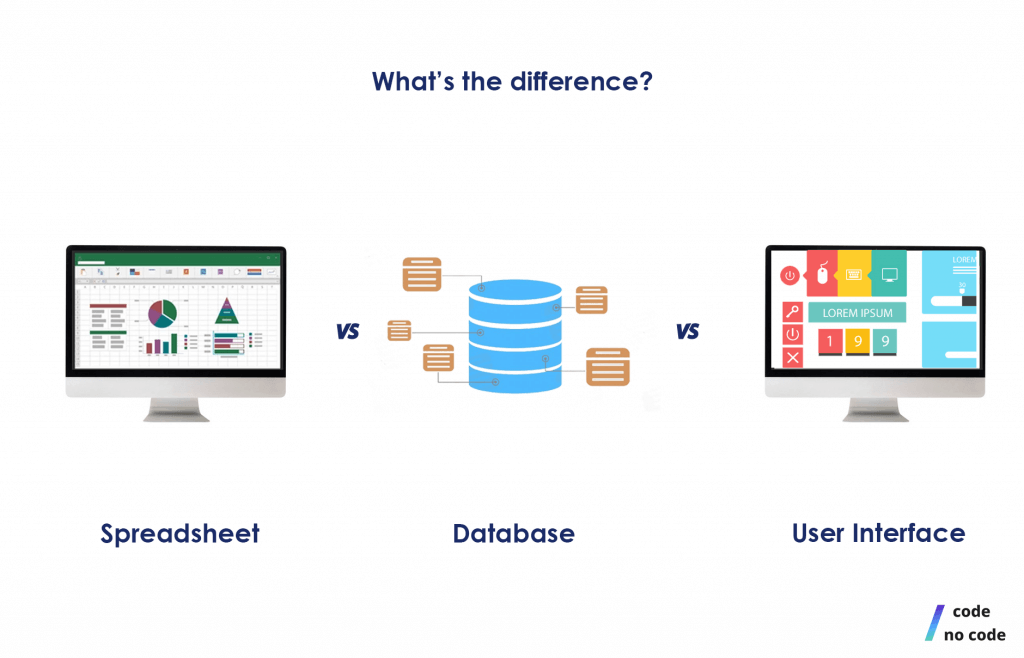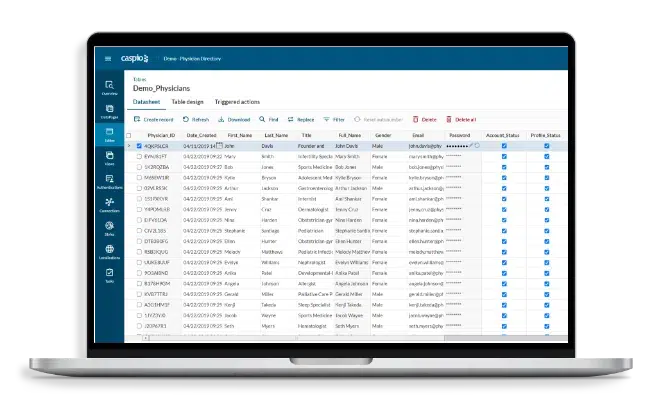Open the Power of No-Code for Open System Data Source Creation
Open the Power of No-Code for Open System Data Source Creation
Blog Article
Checking Out the Advantages of Scalable Databases That Need No Coding Skills for Reliable Data Management Solutions
The appearance of scalable data sources that eliminate the need for coding skills offers a transformative chance for organizations looking for effective data monitoring services. By enabling non-technical users to harness the power of information with user-friendly interfaces, these systems boost availability and foster cooperation across varied groups. Additionally, their cost-effectiveness and adaptability to evolving service needs can significantly enhance operational procedures. As we consider the effects of such developments, it comes to be essential to take a look at how they can reshape the landscape of data monitoring and drive sustainable development in a competitive atmosphere.
Boosted Availability for Users
Enhanced access for users is a vital facet of scalable databases, making sure that information management systems are easy to use and intuitive. In a period where data-driven decisions are vital, access permits a wider array of customers, including those without comprehensive technological know-how, to involve with database systems efficiently. This democratization of information gain access to helps with enhanced partnership across departments, empowering employees to make and remove understandings notified decisions.
Straightforward user interfaces, such as aesthetic information and drag-and-drop functions representation, simplify complex data interactions. These improvements minimize the learning contour connected with typical data source management, making it possible for customers to concentrate on leveraging information instead than grappling with technical intricacies. Scalable data sources often integrate real-time analytics and personalized dashboards, offering customers with immediate insights customized to their specific requirements.

Cost-Effectiveness and Resource Savings
Reliable information management not just pivots on ease of access however also on cost-effectiveness and source cost savings. Scalable databases made for individuals with no coding skills significantly lower monetary concerns typically related to standard database management systems. By removing the requirement for specialized programming experience, companies can assign their sources much more efficiently, concentrating funds on core business tasks rather than considerable training or employing proficient personnel.
In addition, these databases usually use cloud-based solutions, which even more lower costs associated with hardware and upkeep. Organizations can scale their data source solutions according to their needs, staying clear of the costs sustained from over-provisioning sources. This flexibility indicates organizations can adapt to altering needs without sustaining unneeded costs, causing substantial long-lasting financial savings.
Additionally, straightforward user interfaces streamline data entrance and management processes, minimizing the time invested on administrative tasks. This efficiency equates right into labor cost financial savings, enabling groups to concentrate on calculated initiatives as opposed to regular upkeep. In general, taking on scalable databases that call for no coding abilities fosters a much more cost-efficient approach to information monitoring, allowing companies to maximize their sources while preserving high levels of functional performance.
Improved Collaboration Throughout Teams

Furthermore, scalable data sources help with smooth interaction among group participants. With user-friendly user interfaces that require no coding abilities, employees can easily create, change, and share reports or control panels tailored to their specific demands. This democratization of data encourages non-technical individuals to contribute understandings, improving the collaborative setting.
Additionally, these databases support simultaneous accessibility, allowing several go to this website customers to service the very same dataset concurrently. This feature improves productivity, as teams can take part in joint data evaluation without the threat of variation control issues. The capacity to leave remarks or notes directly within the database better promotes discussion and makes clear data interpretations.
Streamlined Data Administration Processes
In today's data-driven setting, companies recognize the requirement of streamlined data monitoring refines to take full advantage of performance and precision. By leveraging scalable data sources that require no coding abilities, companies can streamline their information handling and reduce the complexities normally connected with typical database systems. This availability encourages non-technical customers to involve straight with information, facilitating quicker decision-making and reducing dependence on specialized IT employees.
Streamlined data monitoring processes enhance operations by automating routine tasks such as data access, recognition, and reporting. Automated data integration guarantees that details from different resources is accumulated effortlessly, removing silos and fostering an unified view of crucial company metrics (no-code). Moreover, straightforward user interfaces enable workers to control information conveniently, enabling them to create understandings that drive calculated campaigns without the demand for considerable training.
This performance not just increases operational procedures but additionally reduces the possibility for human mistake, guaranteeing that information stays dependable and accurate. Ultimately, structured information monitoring procedures through scalable data sources result in enhanced efficiency, enabling companies to concentrate on core tasks while making sure that their information management practices are effective and efficient.
Scalability for Expanding Businesses

For broadening enterprises, the capability to scale up or down is crucial. A scalable data source can take care of an increase of data created from brand-new clients, products, or solutions, making sure that organization operations stay continuous. Furthermore, these data sources supply the ability to manage peak lots effectively, which is important throughout durations of rapid development or seasonal spikes.
Additionally, lots of scalable database remedies are created with user-friendly user interfaces that require no coding abilities, encouraging non-technical personnel to manage information effectively (no-code). This democratization of information administration allows companies to assign sources find out this here purposefully and minimize dependency on specialized IT workers
Ultimately, embracing a scalable database not just improves operational performance but additionally cultivates an atmosphere where businesses can introduce and evolve without the constraints of typical database systems. This flexibility settings organizations for lasting success in today's affordable landscape.
Conclusion
In final thought, scalable data sources that need no coding skills supply substantial benefits for reliable information monitoring. By simplifying information monitoring procedures and offering scalability for expanding businesses, such services allow organizations to adapt to altering demands efficiently.
Improved access for customers is a critical facet of scalable data sources, making sure that data management systems are intuitive and user-friendly.Easy to use user interfaces, such as drag-and-drop features and visual information depiction, streamline intricate data interactions. In general, adopting scalable databases that need no coding skills fosters a more cost-effective approach to data monitoring, making it possible for companies to maximize their resources while maintaining high degrees of operational effectiveness.
By leveraging scalable databases that need no coding skills, businesses can simplify their information handling and minimize the complexities generally associated with conventional data source systems - no-code.Structured data management procedures improve workflow by automating regular tasks such as information entry, validation, and coverage
Report this page